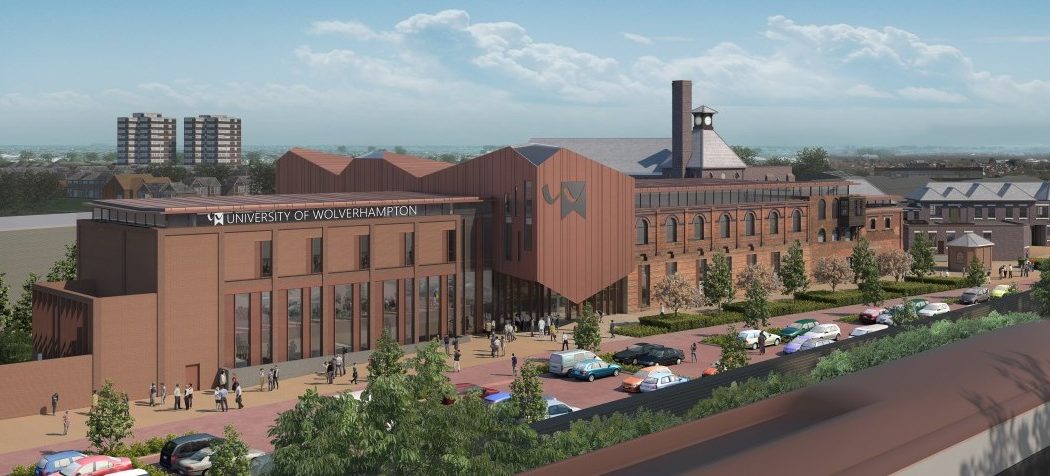The University of Wolverhampton is to be home to the UK‘s new national brownfield research centre that will help tackle the housing shortage, West Midlands Mayor Andy Street has just announced.
The National Brownfield Institute is being funded as part of the £350m Housing Deal for the West Midlands that the Chancellor announced would go to the West Midlands Combined Authority in his Spring Statement. The authority has set an ambitious target to build 215,000 new homes by 2031 to help solve the region’s housing shortage.
Around £100 million of that will be used to buy and clean up former industrial sites in the Black Country to build homes on and the institute will play an integral role in that process.
Appropriately enough, it will be based at the University’s new Springfield Campus, which itself is a 12 acre £100 million brownfield regeneration project in Wolverhampton city centre and will be housed alongside the University’s new School of Architecture and Built Environment. The site of the former Springfield brewery has been transformed into Europe’s largest specialist construction and built environment campus, bringing together businesses and the education sector to maximise impact on the economy.
Professor Geoff Layer, Vice-Chancellor of the University of Wolverhampton, said: “Our vision for Springfield is that it becomes a hub for excellence in construction and the built environment on a national and even international scale. The National Brownfield Institute is a major part of these plans and we see it as being very much a beacon for skills, providing solutions through innovation and new technology for the sector as a whole.”
“There is a huge amount of brownfield land across the Black Country and wider West Midlands and we are looking forward to helping play an integral role in identifying and unlocking that land’s potential for regeneration and in particular supporting ways to address the housing shortage,” he added. “Springfield itself is a perfect example of how brownfield land can be transformed and regenerated supporting jobs and the regional economy.”
Since its purchase in 2014, the derelict site has been rejuvenated into a centre of excellence for construction and the built environment, delivering an unbeatable skills pathway for construction education and training from the age of 14 to senior professionals.
As the home of the West Midlands Construction University Technical College, the University’s School of Architecture and Built Environment, and the Elite Centre for Manufacturing Skills, it’s central to our vision of enhancing the student experience and supporting business growth.
The £100 million development is acting as the catalyst for economic and social regeneration, tailored to creating jobs and delivering the technical and professional experts required by the industry.
It will be home to a team of specialist researchers, consultants and industry experts who will advise on all aspects of brownfield development from dealing with contaminated land to repurposing buildings and sites.
Work has already been started by the University on creating a digital twin map, which is an interactive platform identifying brownfield sites which could be developed and offering full details about size, location and condition. The institute will also look at new and innovative construction methods such as modular housing. It will seek to work closely with industry providing commercial lab testing space and looking at new technology.
The Mayor also announced the launch of a new WMCA £5m Regional Construction Training Fund to help fill the 2,800 additional jobs now being created each year by the region’s booming construction industry. Speaking to an audience of 80 leading construction and property business leaders at an event at Springfield on May 18, 2018 to discuss the future of construction in the region, the Mayor said it was vital that more efficient ways of getting former industrial land ready for development and back to economic use were delivered.
Mayor Street said: “The institute and training fund will help safeguard and nurture our region’s most important assets – its people and land – helping to give everyone the opportunity of a decent job and an affordable home. The West Midlands economy is going from strength to strength but that growth brings its own pressures and we need to build 215,000 new homes by 2031 to meet our future housing and economic needs.”
“That will require fresh ways of thinking and greater use of new, advanced home building methods,” he explained. “But we also need to make sure local people have those skills most needed by house builders and companies building the big transport infrastructure schemes and commercial developments coming on stream. At the moment many are struggling to find local people to fill those jobs so this new training fund will involve working closely with the construction industry to close that skills gap.”
The plans for the School of Architecture form the largest part of the first phase of the £100m redevelopment of the site to create the Springfield Campus. The aim is that it will be delivered in the 2019-20 academic year.
It will join the West Midlands University Technical College, which opened in January 2017, and the Elite Centre for Manufacturing Skills Hub, which will open next month.
The 12 acre Springfield Campus will be a centre of excellence for the built environment, construction and high value manufacturing to be delivered by the University and its partners.
It is part of wider multi-million pound projects to help regenerate Wolverhampton including the redevelopment of Canalside, the £55 million Westside development in the city centre and the ongoing £150m Wolverhampton Interchange project.
Image of Springfield Campus courtesy of University of Wolverhampton.

